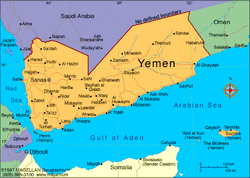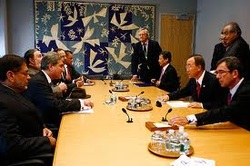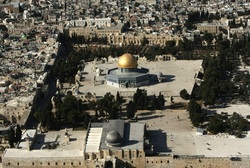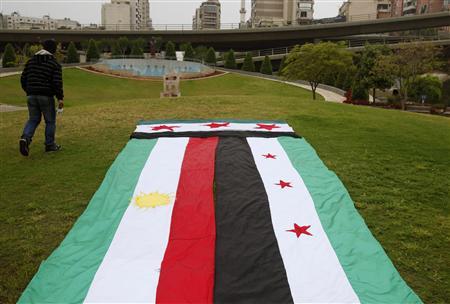|
YEMEN NOT PLAYING WITH IT  SANAA — Fierce clashes killed at least 21 people, including 18 Al-Qaeda militants, on Monday near the southern Yemeni town of Loder, which Al-Qaeda is trying to capture, a local official said. The other dead were an army officer and two tribal volunteers aiding the military. The source said the A-Qaeda militants were forced to retreat in the direction of Amiin, 12 kilometres (7.5 miles) south of Loder. Witnesses said the fighting lasted for several hours, and that air force planes had bombed militant positions in the mountains southeast of Loder, from which columns of smoke could be seen rising. A tank in the hands of the militants, as well as two vehicles mounted with machineguns and ammunition stocks were destroyed, other sources said. Al-Qaeda seized Loder in August 2010, but the army eventually drove it out. Loder lies 150 kilometres northeast of Zinjibar, capital of Abyan province, which was seized last May by the Partisans of Sharia (Islamic law), an affiliate of Al-Qaeda in the Arabic Peninsula.. Copyright © 2012 AFP. All rights reserved. More » Related articles 12 militants killed in Yemen battle, official says Moneycontrol.com - 6 hours ago Qaeda-linked group frees 73 Yemeni soldiers msnbc.com (blog) - 11 hours ago 'Ali Abdullah Saleh to leave Yemen temporarily' Zee News - 19 hours ago More coverage (1) » Add News to your Google Homepage Yemeni army military vehicles drive near the southern town of Loder, in Abiyan province (AFP) Map
0 Comments
TOP U.N. truce monitor in syria attack on Central Bank Reuters) - A Norwegian general charged with overseeing a shaky U.N.-brokered truce in Syria arrived in Damascus on Sunday, boosting a monitor mission that activists say has helped ease the violence in the city of Homs, hotbed of a 13-month uprising.
In the capital, militants fired rocket-propelled grenades at the Central Bank building, causing slight damage, and wounded four police when they attacked their patrol, state television reported. Activists in Damascus reported explosions and gunfire. General Robert Mood acknowledged the huge task awaiting the planned 300-strong unarmed mission, which now has 30 people on the ground, but said he was confident it could make headway. "We will be only 300, but we can make a difference," Mood told reporters on his arrival in the Syrian capital. "Thirty unarmed observers, 300 unarmed observers, even 1,000 unarmed observers cannot solve all the problems," he said. "I call on everyone to help us and cooperate with us in this very challenging task ahead." The United Nations says President Bashar al-Assad's forces have killed 9,000 people during the revolt, the latest in a string of uprisings in the Arab world against autocratic rule. Damascus says 2,600 of its personnel have died at the hands of anti-Assad militiamen, and has accused the United Nations of turning a blind eye to "terrorist acts" against security forces. Syria's SANA official news agency said U.N. observers on Sunday toured the Khalidiya district of Homs, which endured weeks of shelling by government forces before the April 12 ceasefire. An activist in Homs, speaking via Skype, said violence had dropped sharply in the city since the observers deployed a permanent two-man team to the restive city last week. "There are still violations, but the shelling and mortar fire has stopped," Karam Abu Rabea said. "We have insisted that the observers stay in Homs because we know if they leave (the attacks) will continue." He said the presence of the monitors on Saturday had allowed residents to retrieve three bodies that had previously been too risky to collect because of the threat of sniper fire. The lull had also enabled people to clear rubbish left to rot in the streets. "There is a danger of disease from the rubbish. Until now it was left in the streets," Abu Rabea said. BOMBING CLAIM Despite the relative calm in Homs, the Syrian Observatory for Human Rights, a UK-based group tracking the conflict, said at last 39 people were killed across the country on Sunday, including civilians, security forces and rebels. Twenty-three civilians were killed, most of them shot by security forces in a single village in the central province of Hama, it said. Six rebel fighters were killed as well as seven members of the security forces - four of whom died when ammunition they were handling exploded. On Sunday an Islamist group called "al-Nusra Front" claimed responsibility for a suicide bombing that killed at least nine people in Damascus on Friday. Both sides have been accused of multiple violations of the ceasefire engineered by U.N.-Arab League envoy Kofi Annan. Under the deal, Assad's tanks and troops are supposed to return to barracks. Damascus says this has happened, although U.N. Secretary General Ban Ki-moon disagreed this week, saying he was "gravely alarmed by reports of continued violence." "The problem is whether the Syrian government will agree to us deploying our own assets," he said late on Sunday. Ban said Syria's U.N. ambassador had promised unconditional cooperation. But it was difficult to "give full credibility on their promise, because they have not kept their promises," he told reporters during a visit to Myanmar. Besides Homs, the U.N. has established permanent monitoring post in the cities of Idlib, Hama and Deraa. The presence of the monitors has emboldened thousands of protesters to resume demonstrations after weeks of military crackdown, but activists say Assad's forces have hit back. Security forces carried out house to house raids in the Damascus suburb of Irbin on Saturday, arresting demonstration leaders who welcomed the observers a week ago, two resident activists said. (Additional reporting by Martin Petty in Naypyitaw, Myanmar; Writing by Ed Cropley; Editing by Louise Ireland and Stacey Joyce) The tab for U.N.’s Rio summit: Trillions per year in taxes, transfers and price hikes Read more: http://www.foxnews.com/world/2012/04/20/tab-for-uns-rio-summit-trillions-per-year-in-taxes-transfers-and-price-hikes/#ixzz1svcrt1As  The upcoming United Nations environmental conference on sustainable development will consider a breathtaking array of carbon taxes, transfers of trillions of dollars from wealthy countries to poor ones, and new spending programs to guarantee that populations around the world are protected from the effects of the very programs the world organization wants to implement, according to stunning U.N. documents examined by Fox News. The main goal of the much-touted, Rio + 20 United Nations Conference on Sustainable Development, scheduled to be held in Brazil from June 20-23, and which Obama Administration officials have supported, is to make dramatic and enormously expensive changes in the way that the world does nearly everything—or, as one of the documents puts it, "a fundamental shift in the way we think and act." Among the proposals on how the “challenges can and must be addressed,” according to U.N. Secretary General Ban Ki-moon: --More than $2.1 trillion a year in wealth transfers from rich countries to poorer ones, in the name of fostering “green infrastructure, ” “climate adaptation” and other “green economy” measures. --New carbon taxes for industrialized countries that could cost about $250 billion a year, or 0.6 percent of Gross Domestic Product, by 2020. Other environmental taxes are mentioned, but not specified. --Further unspecified price hikes that extend beyond fossil fuels to anything derived from agriculture, fisheries, forestry, or other kinds of land and water use, all of which would be radically reorganized. These cost changes would “contribute to a more level playing field between established, 'brown' technologies and newer, greener ones." -- Major global social spending programs, including a "social protection floor" and "social safety nets" for the world's most vulnerable social groups for reasons of “equity.” --Even more social benefits for those displaced by the green economy revolution—including those put out of work in undesirable fossil fuel industries. The benefits, called “investments,” would include “access to nutritious food, health services, education, training and retraining, and unemployment benefits." --A guarantee that if those sweeping benefits weren’t enough, more would be granted. As one of the U.N. documents puts it: “Any adverse effects of changes in prices of goods and services vital to the welfare of vulnerable groups must be compensated for and new livelihood opportunities provided." Click here for the Executive Summary Report. That huge catalogue of taxes and spending is described optimistically as “targeted investments in human and social capital on top of investments in natural capital and green physical capital,” and is accompanied by the claim that it will all, in the long run, more than pay for itself. But the whopping green “investment” list barely scratches the surface of the mammoth exercise in global social engineering that is envisaged in the U.N. documents, prepared by the Geneva-based United Nations Environmental Management Group (UNEMG), a consortium of 36 U.N. agencies, development banks and environmental bureaucracies, in advance of the Rio session. An earlier version of the report was presented at a closed door session of the U.N.'s top bureaucrats during a Long Island retreat last October, where Rio was discussed as a "unique opportunity" to drive an expanding U.N. agenda for years ahead. Click here for more on this story from Fox News. Under the ungainly title of Working Towards a Balanced and Inclusive Green Economy, A United Nations System-Wide Perspective, the final version of the 204-page report is intended to “contribute” to preparations for the Rio + 20 summit, where one of the two themes is “the green economy in the context of sustainable development and poverty eradication. ” (The other theme is “the institutional framework for sustainable development” –sometimes known as global environmental governance.) But in fact, it also lays out new roles for private enterprise, national governments, and a bevy of socialist-style worker, trade and citizens’ organizations in creating a sweeping international social reorganization, all closely monitored by regulators and governments to maintain environmental “sustainability” and “human equity.” “Transforming the global economy will require action locally (e.g., through land use planning), at the national level (e.g., through energy-use regulations) and at the international level (e.g., through technology diffusion),” the document says. It involves “profound changes in economic systems, in resource efficiency, in the composition of global demand, in production and consumption patterns and a major transformation in public policy-making.” It will also require “a serious rethinking of lifestyles in developed countries.” As the report puts it, even though “the bulk of green investments will come from the private sector," the "role of the public sector... is indispensable for influencing the flow of private financing." It adds that the green economy model “recognizes the value of markets, but is not tied to markets as the sole or best solution to all problems.” Among other countries, the report particularly lauds China as “a good example of combining investments and public policy incentives to encourage major advances in the development of cleaner technologies.” Along those lines, it says, national governments need to reorganize themselves to " collectively design fiscal and tax policies as well as policies on how to use the newly generated revenue" from their levies. There, "U.N. entities can help governments and others to find the most appropriate ways of phasing out harmful subsidies while combining that with the introduction of new incentive schemes to encourage positive steps forward." U.N. organizations can also “encourage the ratification of relevant international agreements, assist the Parties to implement and comply with related obligations...and build capacity, including that of legislators at national and sub-national levels to prepare and ensure compliance with regulations and standards." The report declares that “scaled-up and accelerated international cooperation" is required, with new coordination at "the international, sub-regional, and regional levels." Stronger regulation is needed, and “to avoid the proliferation of national regulations and standards, the use of relevant international standards is essential” -- an area where the U.N. can be very helpful, the report indicates. The U.N. is also ready to supply new kinds of statistics to bolster and measure the changes that the organization foresees—including indicators that do away with old notions of economic growth and progress and replace them with new statistics. One example: “the U.N. System of Environmental-Economic Accounting (SEEA), which will become an internationally agreed statistical framework in 2012." These changes, the authors reassure readers, will only be done in line with the “domestic development agendas” of the countries involved. “A green economy is not a one-size-fits-all path towards sustainable development,” an executive summary of the report declares. Instead it is a “dynamic policy toolbox” for local decision-makers, who can decide to use it optionally. But even so, the tools are intended for only one final aim. And they have the full endorsement of U.N. Secretary General Ban, who declares in a forward to the document that “only such integrated approach will lay lasting foundations for peace and sustainable development," and calls the upcoming Rio conclave a "generational opportunity" to act. Read more: http://www.foxnews.com/world/2012/04/20/tab-for-uns-rio-summit-trillions-per-year-in-taxes-transfers-and-price-hikes/#ixzz1svd2L45r  Spain may cut imports of biodiesel from Argentina. It comes after the Latin American nation decided to nationalise the Spanish-controlled oil company YPF, taking control of 51 percent of the firm from Madrid-listed Repsol. European biodiesel supplies may now be given preference in Spain. “The objective of this decision is to support Spanish and EU refineries, so they can supply biodiesel under competitive conditions,” Soraya Saenz de Santamaria, Spain’s Deputy Prime Minister, said at a news conference. Spain is thought to have imported around 750 million euros worth of biodiesel from Argentina last year. Argentina’s president Cristina Fernandez says her country could use more of the fuel itself if Spain follows through with its threatened cut.  Egypt’s Muslim Brotherhood denounces Jerusalem visit by nation’s top Islamic cleric Grand Mufti Ali Gomaa replied that his two-hour visit on Wednesday was a show of solidarity with the Palestinians’ claim to Israeli-held east Jerusalem. Comments Personal Post The boycott is not state-sanctioned, but it has been endorsed by a wide range of Muslims, including the fundamentalist Muslim Brotherhood, more radical groups and institutes whose heads are appointed by the state. The travel ban also has the backing of professional unions, universities and private associations. In the past, some who have defied the ban have been ostracized. On Thursday, Gomaa responded that he went to Jerusalem in a personal capacity. He said the trip was a “surprise” organized by Jordan. He insisted he did not get an Israeli visa to enter the city, and he did not deal with Israeli authorities. Gomaa said the visit “was to support Jerusalemites and the Palestinian people and the Al-Aqsa Mosque and to learn about the great suffering they go through.” His comments were carried by the Egyptian news agency MENA. Gomaa was summoned Thursday by a body of senior clerics at Cairo’s Al-Azhar, the Sunni Muslim world’s most prestigious learning institute, to explain why he violated the boycott. The clerics repeated their rejection of visits to Jerusalem and Al-Aqsa while under Israel’s control but stopped short of reprimanding the mufti, who prayed at the Al-Aqsa Mosque, Islam’s third-holiest site. Osama Yassin, a senior official of the Brotherhood’s political arm, said Gomaa must be held to account for his visit to Jerusalem. “What he did cannot be justified and cannot be endorsed,” Yassin said in comments posted on the Brotherhood’s website. He did not elaborate. Israeli officials declined to comment. The Muslim Brotherhood has emerged as the most powerful political group after the fall of Hosni Mubarak’s regime last year, dominating the new parliament. The Brotherhood hopes to replace the leadership of Al-Azhar and other mainstream religious institutes to oust officials appointed by Mubarak. The fallout over Gomaa’s visit exposed a debate among Egyptians over the boycott of Israeli-controlled Palestinian areas, particularly Jerusalem, with its significance to Muslims and Christians. The Palestinians have called on Muslims to visit the holy city and reinforce their claim to the eastern part of Jerusalem as the capital of a future state. Muslim clerics counter that such visits would endorse Israel’s control of the city. The ban, which followed Egypt’s peace deal with Israel in 1979, was supported by the Christian Coptic Church in the past. After the death of Coptic Pope Shenouda III last month, there was a notable spike in the number of Egyptian Christians traveling to Jerusalem for Easter. Gomaa was appointed by to his post in 2003 by Mubarak. Gomaa heads Dar al-Ifta, which advises Muslims on spiritual and life issues ranging from marriage rituals to commercial dealings. Israelis have watched with concern the rise of Islamists in Egypt after Mubarak’s ouster a year ago. Islamists now dominate the first post-Mubarak parliament, and several are running for president in elections due next month. Copyright 2012 The Associated Press. All rights reserved. This material may not be published, broadcast, rewritten or redistributed. |
PTAH
TALKING TEXAS NU INFO ON ALMOST ANYTHING THATS INFORMITIVE Archives
November 2013
Categories |
|
|
- KAM
- don't jump into the pacific ocean or evacuate earth 'yeah nothing like that"
- sum moore
- Now it'z Our TIME
- The 1
- multipolar harmonicz
- laptop gate
- zaporozhye nuclear power plant news
- fukushima
- fallout/ radiation
- BOARDER BLOG
- terrorist state
- food now
- Climate change we must Change
- FOCUS FILMZ POLITICAL
- IZM GALLERY
- IZM TV/NEWS
- YOU KNOW WHO IT IZ
- ON YOUR BACK & BEYOND STYLE
- izm party
- Global biz
- ASCENDING MASTERS
- WHAT'Z UP WITH IT
- WORLD WIDE PEACE AND LOVE OR WAR
- JOURNEY OF PTAH
- INNOVATION
- tech/ cyber.S
- colonial semi yuanizm
- WHAT IZMIST DO
- GOLDEN AGE
- focus filmz
- cosmic alignment 2012
- THE PEACE AND LOVE FOUNDATION INC
- PROBLEMS IN LIES THE SOLUTION
- planet DISNEY
- melting pot
- fallout/radiation videos and info
- planet Elizabeth Taylor
- FOCUS FILMZ POLITICAL ON LOCATION
- we R the children
- books of knowledge
- Nu age
- TRUTHIZM" they will watch you die"
- CHEIF
- source of allmediaizm
- ptah messages from the beyond"
- COVID/19
- HEMP & CANOPY NEWZ
- CHINA BLUEIZM
- 4LIGHT IZ ZOUND


 RSS Feed
RSS Feed
